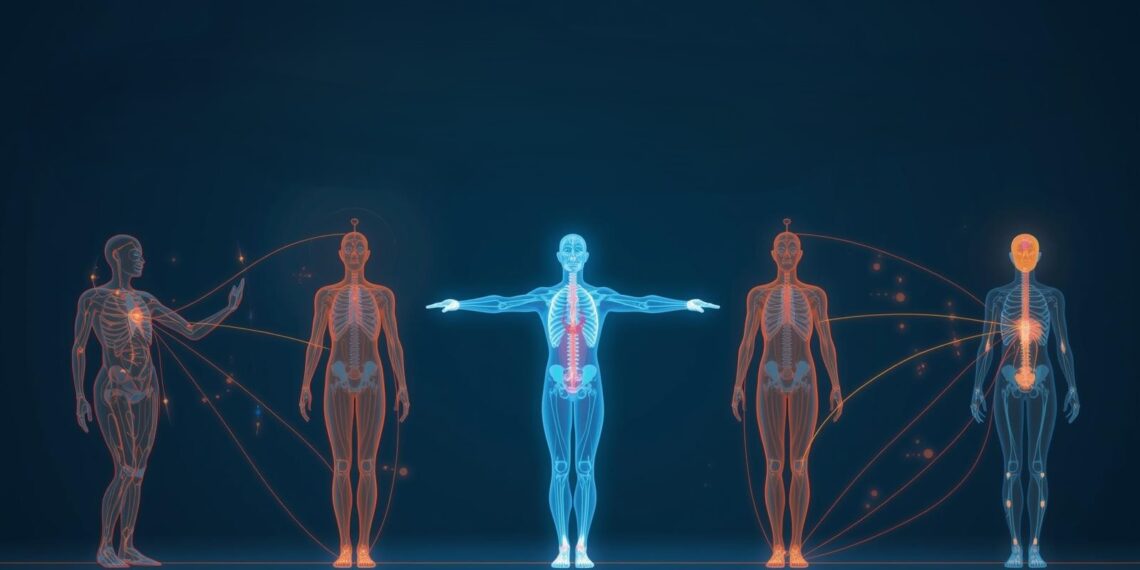In the ever-evolving landscape of wellness, the concept of proprioception—a term that may not be familiar to everyone—stands as a cornerstone of body awareness. Proprioception is the body’s ability to sense its position and movement in space, a crucial element in both everyday actions and complex physical activities. This article delves into the science behind proprioception, exploring its significance in wellness and its implications for modern lifestyle practices.
What is Proprioception?
Proprioception, also known as somatic awareness or kinesthetic awareness, refers to the unconscious perception of movement and spatial orientation arising from stimuli within the body itself. It is a sophisticated sensory system that enables individuals to perform tasks without directly observing their limbs. When you close your eyes and touch your nose, it is proprioception that guides your hand accurately.
The Mechanisms Behind Proprioception
Proprioception is facilitated by sensory receptors located in the muscles, tendons, and joints. These receptors send signals to the brain about the position, movement, and tension of different body parts. The brain then processes this information to provide a sense of body position and movement without visual input.
This sensory feedback loop is crucial for maintaining balance and coordination, which are essential for physical activities ranging from walking and running to more intricate movements required in sports or dance. Understanding how proprioception functions helps us appreciate its role in enhancing somatic awareness and kinesthetic awareness.
The Role of Proprioception in Wellness
Incorporating proprioceptive exercises into wellness routines can greatly enhance physical and mental well-being. Exercises that challenge balance and coordination, such as yoga, Pilates, and tai chi, not only improve physical health but also heighten awareness of body position scientifically. This increased awareness fosters a deeper connection between mind and body, which is a foundational aspect of holistic wellness practices.
Enhancing Daily Life Through Proprioceptive Training
Proprioceptive training is not limited to athletes or fitness enthusiasts; it offers benefits for people of all ages and fitness levels. By improving balance, coordination, and body awareness, proprioceptive exercises help prevent injuries and enhance overall quality of life. Simple activities, such as standing on one leg while brushing your teeth or walking on uneven surfaces, can be effective in strengthening proprioceptive abilities.
For wellness product developers, understanding the importance of proprioception can inform the design of innovative products that cater to consumer needs for improved body awareness. For example, balance boards, stability balls, and other equipment that promote proprioceptive engagement are becoming increasingly popular in the wellness market.
Proprioception and Mental Well-being
Beyond physical benefits, proprioception also plays a significant role in mental health. Engaging in activities that enhance proprioceptive awareness can reduce stress, improve concentration, and promote relaxation. This connection between physical and mental health underscores the importance of integrating proprioceptive elements into wellness practices, offering a holistic approach to well-being.

Proprioception in Contemporary Lifestyle and Culture
The modern wellness industry increasingly emphasizes the importance of body awareness as a means of achieving personal growth and self-improvement. As societal trends shift towards mindfulness and self-care, proprioception becomes a vital component of this cultural movement. It encourages individuals to cultivate a deeper understanding of their bodies, fostering a sense of empowerment and autonomy.
Implications for Wellness Professionals
For lifestyle magazine editors, understanding proprioception provides valuable insights into the intersection of wellness trends, identity, and social practices. Articles that explore these connections can engage readers by highlighting the transformative power of body awareness in achieving a balanced and fulfilling life.
Health and wellness coaches can leverage proprioceptive principles to craft personalized strategies that align with clients’ evolving wellness goals. By incorporating exercises and practices that enhance body awareness, coaches can help clients achieve a more profound sense of well-being.
The Future of Proprioception in Wellness
The growing interest in proprioception reflects a broader trend in the wellness industry towards personalized and experiential approaches to health. As consumers increasingly seek products and services that cater to their unique needs, proprioception offers a promising avenue for innovation.
As we look to the future, the integration of technology with proprioceptive training is likely to expand. Wearable devices and virtual reality platforms that provide real-time feedback on body position and movement are already gaining traction, offering new ways to enhance proprioceptive awareness and improve overall wellness.
Conclusion
Proprioception, the science of body awareness, is an integral aspect of modern wellness practices. By understanding and harnessing the power of proprioception, individuals can enhance their physical and mental well-being, while wellness professionals can develop products and strategies that resonate with contemporary lifestyle trends. As the wellness industry continues to evolve, proprioception will undoubtedly play a pivotal role in shaping the future of health and well-being.
By embracing proprioceptive principles, we not only improve our physical capabilities but also cultivate a deeper connection with ourselves, paving the way for a more mindful and fulfilling life.




